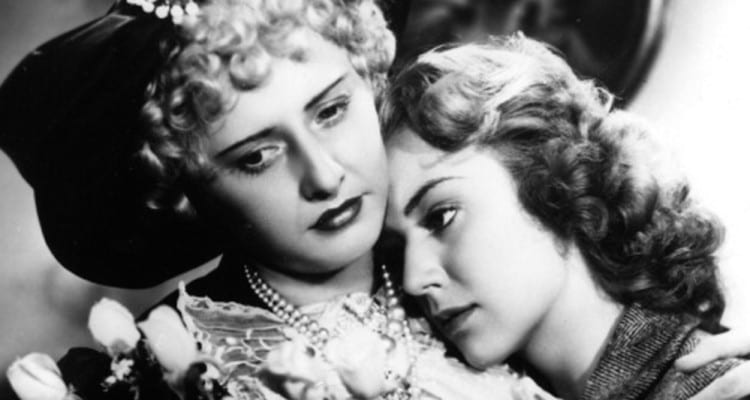Spoiler warning for Stella Dallas, Jessica Jones, Downton Abbey, Amor Real, Captain America: Civil War, Gossip Girl, Mad Max: Fury Road, The 100, Guardians of the Galaxy vol. 2, and Supergirl (kind of).
What do you think of when you hear the world “melodrama”? Maybe telenovelas come to mind. Maybe you think of that time someone called you melodramatic, or even calling someone melodramatic yourself.
I’ve noticed that the term is often used with a negative connotation. Usually it’s when someone’s (typically a woman’s) feelings are inconveniencing another person. I’ve also noticed melodrama (like telenovelas) is most often associated with women. That is not only reductive and sexist, but also misinformation about what melodrama is.
Have you ever heard someone say that they hate the use of dramatic music in certain moments? This sentiment is shared by general audiences, film critics, scholars and even creators. Even I was, in my more snobbish youth, victim to these thoughts. “That’s manipulation!”, I would yell at the screen, “So melodramatic”.
And, well, yes, it is.
The term “melodrama” comes from the Greek “melos”, which means music. So music + drama = melodrama. Of course, the definition has evolved over the years. In film and television, melodrama is a subgenre of drama distinguished by narratives that center around emotions and seeks to wake strong ones in their audience. So how come it is not associated with emotional drama but rather over-dramatic emotion? And how did it come to be considered as a women’s genre almost exclusively? And should it be? (Spoiler alert: No.)
First, some background.
History (a.k.a. where I talk about formal theory)
Melodrama’s origins date back to the theater, which begat narrative cinema. The term has floated around for all these years with different meanings. There have been many attempts at either rejecting it or validating it.
Believe it or not, in the 1940s and 1950s, critics and audiences called action movies or detective stories melodramas. Movies now known as film noir were called melodramas at the time of their release.
It wasn’t until the 1970s when film theorists became concerned with defining melodrama as a genre—film noir had since been coined and assigned to dark brooding detective dramas. This was not an effort to belittle melodrama, quite the contrary. Because melodramatic elements could (and can!) be identified in many different genres, there was a push to define it as a genre itself. This way, it had validity like westerns or film noir. Thus, theorists identified the family melodrama as the ultimate exponent of the newly-defined genre.
Feminists and Melodrama
It’s important to note that the 70s was also when Feminist Film Theory came to fruition. Feminist theorists at the time were preoccupied, among other things, with how Hollywood tried to appeal to women. They criticized the role of women in family melodramas, which was basically as willing victims of their situation. Their primary role was to give men validation and to fix the family’s problems, often at the expense of their own wants and desires.
A good example of this is Stella Dallas (1937). Stella, a poor woman, marries a rich guy and has a daughter, Laurel. Stella is vulgar and unrefined and cannot change this, despite trying. This embarrasses and accidentally sabotages Laurel. In the end, the only way to help her daughter is to completely remove herself from her life. It’s a sad ending, but the narrative portrays it as bittersweet

Feminists of the 1970s identified the melodrama as the women’s film according to Hollywood. Despite theorists later denying the fact that all melodramas were solely for and about women (e.g. Rebel Without a Cause), somehow, it stuck. To this day, melodrama has never been definitively defined in film studies. Yet many consider it a woman’s genre, and not only that, they disregard it as necessarily silly and over-the-top, kind of like…
Telenovelas
Ah, telenovelas. If you’re Mexican you’re bound to at least have caught a glimpse of one when you went to visit your auntie Juanis’s house. It is also likely that you got slightly hooked on one, at some point, by accident, okay? If you’re not Mexican, maybe you saw this meme at least:

Me? I got hooked on Amor Real (Real Love), when I was around 12. It was a period piece about Matilde, whose mother arranges her marriage rich hacienda owner Manuel, even though she’s in love with dashing young officer Adolfo. Her lover follows her to the hacienda and gets a job with a fake name. The audience, and Matilde, slowly fall in love with Manuel.
Most of the conflict in telenovelas is caused by omissions or misunderstandings caused by the characters’ feelings. Matilde falls in love with Manuel, but she can’t make Adolfol leave. When Manuel finds out the truth, she has been covering for Adolfo too long. After Adolfo goes, there is nothing physical stopping them from working it out and being together. Wait, that sounds familiar?
Let’s travel thirteen years and three thousand miles to Yorkshire, inside of Downton Abbey, where Matthew, the young heir, decides he cannot be with Mary, the protagonist. The reason is his ex-fiancé saw them dance, got sad and subsequently died, so he feels extremely guilty. He claims he and Mary don’t deserve to be happy together. There is nothing, no one at this point opposing this union, physically or otherwise, except emotion. There are no fast-zooms and “dun dun duns!” or praying out loud in a chapel to violin music, but this is still melodrama.
To be fair, a lot of people would consider Downton Abbey melodramatic, so…
Let’s reach a little bit more
Remember the basic definition of melodrama? Narratives centered around emotion. Under that definition, isn’t all fiction melodrama? The way all stories engage an audience is to connect with their emotions. Conflict between characters, to have impact, must be emotional.
Let us use Captain America: Civil War as an example:
Captain America (Cap) and Iron Man are fundamentally different in their ideals. After the events of Avengers: Age of Ultron, Iron Man is feeling guilty about the deaths he The Avengers caused, so he supports signing accords to make them accountable. Meanwhile, Captain America remains as self-righteous as ever. This happens in the first 20-something minutes, setting up the stakes of a team already ideologically divided. This division, however, becomes personal when Bucky, Steve Rogers’s (Cap’s) childhood friend resurfaces and is on the run from authorities.
Steve knows Bucky is brainwashed, and yet he cannot bring himself to take emotions out of the equation. He loves Bucky, the only thing left from his childhood in a world that left him behind. Those emotions bring him to extremes, from pitting his friends against each other to hiding a very serious secret from Tony Stark (Iron Man).
Tony discovers the truth, that the Winter Soldier (Brainwashed!Bucky) killed his parents. He also knows Bucky was being controlled, but he cannot separate him from the Winter Soldier: the person responsible of him losing his parents. Therefore Steve is now the person who withheld closure (and justice) from him.
It is all those emotions, and our empathy for them, that make the climax powerful. When Tony and Steve trade punches, not as Iron Man and Captain America, but as a kid who lost his parents, and as the friend desperate to save the last thing remaining of his childhood, you feel for them (or I did, at least). It is not about the accords, or the Winter Soldier or the Avengers, it’s about Tony and Steve and their feelings. And that, folks, is melodrama right there.

That is not to say that the film is primarily a melodrama, but it has melodramatic elements and scenes, as do many films and shows people would not associate with the term.
In Mad Max: Fury Road, that moment when Nux makes eye contact with Capable and whispers “witness me” just before he sacrifices himself? Melodrama. Melodrama. In Supergirl, everything Kara says and does under the influence of Red Krypotonite: melodrama. Jane the Virgin: melodrama! Jessica Jones is, in many ways, a melodrama. So what conclusion can we draw from that?
We need emotion
Melodrama is not only everywhere, I would argue it is necessary for stories to hit home. There must be a strong emotional through-line that culminates in a highly emotional climax. This doesn’t mean there is not bad use of melodrama out there, over-the-top, manipulative and convoluted. The Downton Abbey example was such a case. It feels like extending the drama without real reason to. But the problem there is the lazy writing, not the heightened emotion.
If we feel what the characters feel we will buy their decisions and support them even if we know them to be bad. We get why Jessica Jones cannot get her life together, and why Tony punches the crap out of Steve and why he reciprocates, we understand why Nux is willing to sacrifice himself…
Fans talk about characters as if they were real people. We get angry and when things happen to them that we think they don’t deserve. And the feeling is so real it’s not even funny. My blood still boils when I think about the fact that Blair ended up with Chuck on Gossip Girl. And while it has been two years after Lexa’s death on The 100, her death is still an open wound. Have lots of free time and like risk? Why not to head for an online casino in Australia and hit a nerve. Exciting games, luring sounds, big money, promise of easy money… What you have to do is to find Australian licensed online casinos! And the site onlinecasinos-australia.com is here at your fingertips to help you to take what I wanted from life. The characters and the stories (in most cases) are not real, but our emotions about them certainly are.
Once, someone described emotions to me as feelings before we process them, and it made sense, I thought. Emotion is seen as a negative, in many walks of life. During the Morelia Film Festival last year, Guillermo del Toro said that his friend, Alejandro González Iñárritu told him something that stuck to him: “emotion is the new punk”. We live in a world where it’s wild and rebellious to be sentimental. People are afraid of it, and label “emotional reactions” as instantly bad (if you follow the news lately you can see it loud and clear). Women receive that “criticism” often enough. And look, I agree we must learn to process emotions before we react, I reject the idea of suppressing them or immediately disqualifying them.
Melodrama does the opposite of suppressing them, it allows the characters to be emotional. It also extends an invitation for us to be feel things as intensely. We can’t even help getting hooked on over-the-top melodramas. We sneak a peek through the corner of our eye at our aunt Juanis’s house, or we watch it in the dark of night on a private window of our browser.
My point is we shouldn’t have to hide. It is good to crave feelings, we should be allowed to seek them out without feeling ashamed.
Source cited: Melodrama, by John Mercer and Martin Shingler (Wallflower Press, 2004)
Images courtesy of The CW, Samuel Goldwin Productions, Televisa and Marvel Studios.

